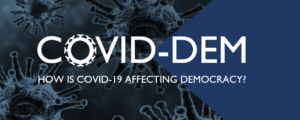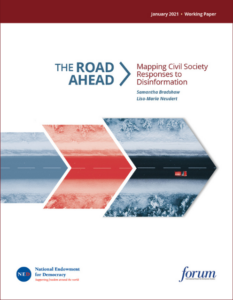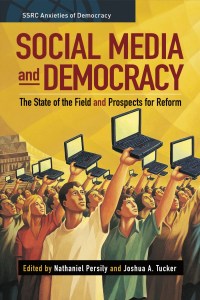 The COVID-19 pandemic and its devastating social and economic repercussions have provided a golden opportunity for malevolent actors to push anti-Western narratives into the mainstream, notes analyst Daniel Milo. Both Russia and China have taken advantage, but Russia’s approach, at least initially, seems to have been more successful, given that it was built on a well-established disinformation playbook that has been in use for years, especially in Central and Eastern Europe (CEE).
The COVID-19 pandemic and its devastating social and economic repercussions have provided a golden opportunity for malevolent actors to push anti-Western narratives into the mainstream, notes analyst Daniel Milo. Both Russia and China have taken advantage, but Russia’s approach, at least initially, seems to have been more successful, given that it was built on a well-established disinformation playbook that has been in use for years, especially in Central and Eastern Europe (CEE).
Its effects, unfortunately, have been doubly disastrous, as they have not only successfully spread doubts about the West’s competence, but have likely cost countless lives in the region through the promotion of dangerous conspiracy theories, he writes in The Deadly Effects of Disinformation, an analysis for the Center for European Policy Analysis:
 While all the countries of CEE joined both the EU and NATO more than 10 years ago, the image of the West as a “shining city on the hill,” epitomized by the EU, NATO, and the United States, seems to be losing its broad appeal, and a more cautious, maybe even opportunistic, attitude is emerging among voters. Such an attitude is evidenced in the latest GLOBSEC Trends report, where 52 percent of CEE’s population stated they would prefer their country to balance between the West and the East. It is a manifestation of a strong self-identification with Central European identity, and a testament to a complicated regional history, but it also signals growing fatigue with the failed promise of European economic “convergence”.
While all the countries of CEE joined both the EU and NATO more than 10 years ago, the image of the West as a “shining city on the hill,” epitomized by the EU, NATO, and the United States, seems to be losing its broad appeal, and a more cautious, maybe even opportunistic, attitude is emerging among voters. Such an attitude is evidenced in the latest GLOBSEC Trends report, where 52 percent of CEE’s population stated they would prefer their country to balance between the West and the East. It is a manifestation of a strong self-identification with Central European identity, and a testament to a complicated regional history, but it also signals growing fatigue with the failed promise of European economic “convergence”.
To prosper, democracy needs a certain kind of public sphere, one in which citizens and their representatives engage in vigorous argument on the basis of shared facts. Restoring that kind of public sphere is now a central task for the renewal of liberal democracy. Call it the fact fightback, argues Timothy Garton Ash, the author of Free Speech: Ten Principles for a Connected World.
To address this challenge, we need a twin-track strategy, he writes for the Guardian:
 On the first track, individual democracies must tackle the particular problems of their own national information environments. In Britain, for example, the battle to defend and improve the BBC is more important than anything the UK government does about Facebook or Twitter. A public service broadcaster such as the BBC gives us not just verified facts but a curated diversity of arguments in one place: a digital Pnyx. Any democracy that has a decent public service broadcaster should double its budget, strengthen its independence from government and task it with enhancing the digital public square for tomorrow’s citizens….
On the first track, individual democracies must tackle the particular problems of their own national information environments. In Britain, for example, the battle to defend and improve the BBC is more important than anything the UK government does about Facebook or Twitter. A public service broadcaster such as the BBC gives us not just verified facts but a curated diversity of arguments in one place: a digital Pnyx. Any democracy that has a decent public service broadcaster should double its budget, strengthen its independence from government and task it with enhancing the digital public square for tomorrow’s citizens….- Yet no single nation is big enough to take on the private superpowers of the digital world – Facebook, Google, Amazon, Twitter, Apple, Netflix. Here, on this second track, we need the co-ordinated action of a critical mass of democracies, starting with the US and those of the European Union. …What we need now is a process, led by the US and EU, to distil some coherent policies from what is already a large body of good research. Some, such as amending the US Communications Decency Act to make platforms more directly responsible for curbing harmful content, will depend on the new US Congress. Others, such as breaking what are clearly monopolies or near-monopolies, will require a strategic combination of EU competition policy and revised US anti-trust legislation.
 Ideally, this would result in a set of proposals being put before the “summit of democracies” planned by the US president, Joe Biden, adds Garton Ash. Of course, 80 different countries are not going to adopt identical measures. But there must be some coherence in the underlying principles and basic approaches, otherwise the internet of the free, which has already lost China, will become even more of a splinternet. RTWT
Ideally, this would result in a set of proposals being put before the “summit of democracies” planned by the US president, Joe Biden, adds Garton Ash. Of course, 80 different countries are not going to adopt identical measures. But there must be some coherence in the underlying principles and basic approaches, otherwise the internet of the free, which has already lost China, will become even more of a splinternet. RTWT
The impact of social media on democracy is addressed by Nate Persily, co-director at the Stanford Cyber Policy Center, and Josh Tucker, a professor of Political Science at NYU, the editors of the recent volume Social Media and Democracy: The State of the Field and Prospects for Reform.
Social Media and Democracy Podcast #34 https://t.co/swWHSRqfTq
— Democracy Digest (@demdigest) February 9, 2021







